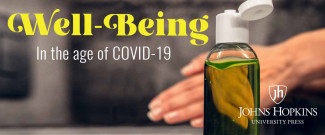
Johns Hopkins UniversityEst. 1876
America’s First Research University
“Dementia-Aware” Support for Family and Professional Caregivers Through the COVID-19 Pandemic


By Laura Wayman
Whether you are a family caregiver caring for a loved one, or a professional caregiver caring for many, I am sure you will agree that dementia care brings with it a myriad of challenges that can change and shift daily even in the best of circumstances. Dementia is overwhelming not only for the people who have it, but also for their caregivers, family members, and local communities. Even without the COVID-19 threat, family and professional dementia caregivers are already stressed, often going without enough sleep, time to exercise, and opportunities for healthy eating simply because the dementia care role is continuously making demands on their time, energy, and emotions.
Now add the coronavirus pandemic, forcing everyone to navigate ominous new challenges that threaten not just the vulnerable person being cared for, but also the caregiver. And let’s not forget the fact that dementia care already demands social isolation and strict adherence to routines with little or no relief. And now even more a person with dementia should not be exposed unnecessarily to gatherings, public transportation, or unnecessary visitors who may be infected even if they are not showing symptoms. According to the Alzheimer’s Association, seventy-four percent of caregivers say they are concerned about maintaining their own health in general, however this concern is heightened even more during this crisis. There’s no perfect solution for everybody these days, and if you are providing dementia care as a family member or a professional you are facing uncharted territory. Talk about kicking you when you are already down!
In light of these concerns, let’s work first to minimize virus exposure for yourself as well as the person you care for:
- It is important to stay connected as much as possible at this time. If you are caring for a person at home, you may not be able to have visitors, but keeping in touch with friends and family over the phone or on Facetime may help. Many support groups and meetings have started using Zoom or Skype to continue with social engagement over the internet to help caregivers who are isolated at home.
- Many social activities and respite programs have been cancelled or limited during this time. Structure your day to include activities you both enjoy. Schedule time for a walk, time in the garden, calling a friend or family member, listening to music, reading, or watching a television show or movie.
- Now is a good time for those who attend day programs to stay home, and the primary caregiver needs to stockpile an extra month or two of necessary medications in preparation for possible shortages or health care provider unavailability and attend health care appointments via telehealth rather than in person.
- If you are required to self-isolate but the person you care for is not living with you, there are some things you can do to continue to support them. Staying in touch via phone, Facetime, Zoom or Skype, or sending greeting cards and flowers can be a good way to show the individual with dementia that you care.

And why am I suggesting “dementia-aware” care approaches, perspectives, tips, and practices? Because dementia care is an ever-changing landscape, it is important to stay open to new learning as dementia will continue to alter and diminish the individual abilities. To become “dementia-aware” means that you display a high level of knowledge of all the moving parts of dementia and the many causes of it, and seek tools to adapt and respond effectively, coming from a place of acceptance instead of denial. For example, cognitive impairment gets in the way of self-protection because a vulnerable person may not understand the risk of disease or think about being as careful as necessary. This makes a person with dementia an easier target for coronavirus infection.
Now that your “normal” is also being altered by COVID-19, here is a summary of how to integrate “dementia-aware” care strategies with common infection control methods:
- The CDC recommends that persons wash their hands with soap and water for at least 20 seconds, especially after going to the bathroom, before eating and after blowing their nose, coughing or sneezing. Caregivers can encourage more frequent and/or longer hand washing by singing two choruses of “Happy Birthday” together.
- Use a soothing tone and explain step by step. Often individuals with dementia can no longer anticipate what step is coming next. Gently guide them (practice show and tell); “First, let’s wet our hands under the water”, “Now let’s use the soap dispenser to get soap into our hands.” Then, “Rub your hands together with the soap like this”, show them how to lather the back of their hands, between fingers and under nails.
- Use positive action statements (“you are so good at keeping your hands clean,” “thank you for helping us all to stay healthy,”) gently directing them to a more cooperative and trusting frame of mind. Soap dispensers are easier and safer to use than bars of soap.
- If soap and water are not available, use an alcohol-based hand sanitizer with at least 60% alcohol.
- Make all supplies (tissues, wipes, hand sanitizers) easy to access nearby. Keep wipes handy to do a fast hand wipe down rather than a long hand washing due to “care resistance” (the inability to process and understand why they need to practice more extensive infection control practices). Make handwashing and massage a regular activity throughout the day.
- Clean and disinfect frequently touched objects and surfaces.
- Extra rest throughout the day is also important, for both the person being cared for as well as the caregiver.
We have a duty to protect the most vulnerable among us, a group that includes older adults with cognitive impairment and their caregivers. Preventing infection must be paramount in our minds, particularly for those at greater risk.
For additional “dementia-aware” tips and strategies to manage changes in behavior due to isolation, change of care routine, reduced social contact and activities, check out my website, www.laurawayman.com and my book, A Loving Approach to Dementia Care, 2nd Edition, published by Johns Hopkins University Press.
Laura Wayman holds an associate in arts degree in gerontology and is a certified Social Services Designee. She has over a decade of experience in and a strong dedication to quality aging. She is a professional dementia care consultant; the CEO of The Dementia Whisperers; and a sought-after speaker on dementia and issues of aging. Wayman is the author of A Loving Approach to Dementia Care: Making Meaningful Connections with the Person Who Has Alzheimer's Disease or Other Dementia or Memory Loss.

